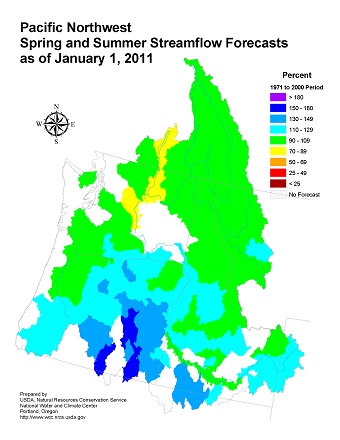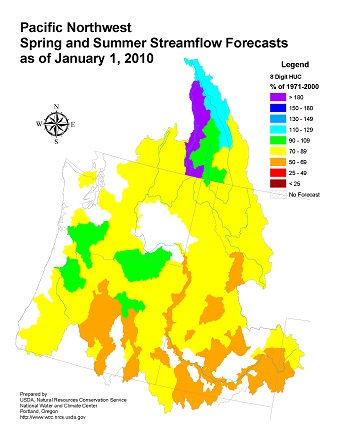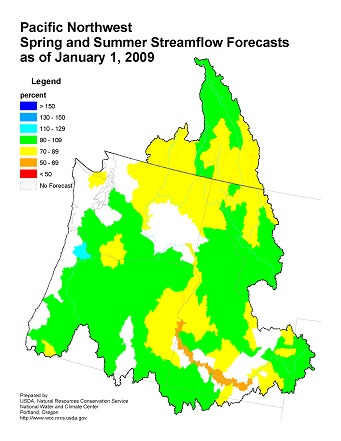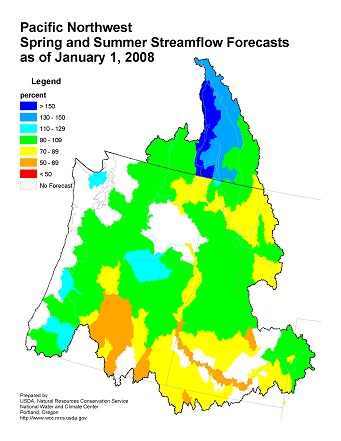Dept. of Energy’s Claim About Climate and Hydro Doesn’t Hold Water
The U.S. Department of Energy yesterday released a report on “Impacts to the Energy Sector from Climatic Conditions.” It notes “climate change is happening — and the effects are already being felt across the country.” The report examines how “decreasing water availability” and other impacts are harming energy production.
This claim caught my attention:
Columbia River, Washington
Summer 2010
Below normal precipitation and streamflows in the Columbia River basin resulted in insufficient hydropower generation to fulfill load obligations for the Bonneville Power Administration. As a result, BPA experienced a net loss of $233 million, or 10%, from the prior year.
The reality is exactly the opposite. During the past few years, Pacific Northwest dams have actually had to deal with excess water flow and hydro power.
In the fall of 2010, Oregon Public Broadcasting highlighted the problem. Their story noted “When a string of storms hit the Northwest this spring, there was so much water in the rivers — and so much wind along the gorge — more power was being produced than the BPA could sell.”
The same thing happened in 2011. Federal Regulators found that BPA had so much water that it had inappropriately violated wind-power contracts, refusing to take energy because of the hydro surplus. The Seattle Times reported, “For Bonneville, the toughest challenges have come in the spring and early summer when snow melts increase river flows and blustery winds boost wind production. Also, to protect migrating salmon, more water is run through the turbines rather than over the dams.”
Part of the problem, ironically, is that there is currently an overcapacity of wind power and utilities are required to purchase wind energy to meet state-mandated requirements. When a surplus occurs, BPA is forced to choose between paying companies to use energy (reducing the oversupply) or violating wind-power contracts to prevent excess energy from going on the grid they control.
Another reason there is an oversupply of hydro power, as the Seattle Times notes, is that excess streamflow must be run through turbines, generating excess electricity, because spilling water harms fish. Environmental requirements to protect fish end up creating excess energy that contribute to the oversupply.
The DOE is also engaging in cherry picking by choosing 2010 and ignoring other years.
Below are the streamflow forecasts for the years 2008-2011. Note that 2010, the year DOE highlighted, was the worst year. As you can see, 2011 streamflows were significantly above normal.
The Department of Energy is very inconsistent in the years it chose for the graphic. In Kansas it chose July of 2012, but in Nebraska it chose 2006, in North Carolina it chose 2007, for Texas it is 2011 and in Florida it is 2004. Instead of looking at trends, DOE chose the particular year that suited their narrative, ignoring all other data.
In the Pacific Northwest, it not only ignored the trend, it ignored the reality on the ground that in 2010 hydro power was available in excess rather than scarce.
This is only the latest example of agencies ignoring the science and data to push a political agenda. Bad science, however, leads to bad policy and there is increasing skepticism about climate policy as the false narrative used by politicians and political agencies is visibly at odds with reality.




It appears that the DOE of the current administration has trouble making decisions that are truly logical, beneficial to the public and tax payers and not for the political benefit of friends of the administration.
It’s important to be more aware of the issues and voice your concerns accordingly. If not, it becomes easier for government to act based on self-interest and disregard for the common good of society.
It’s very hard to make absolute claims about climate change. While we should all be aware of the damages we may be producing to the atmosphere, we also have to base our views on facts and the science behind all of this is often contradictory. The average person needs to be an advocate for objectivity across the board. We’re far from that.
Science would indicate that GHG’s deteriorate the atmosphere in large amounts and that they don’t, so how would people be objective about science when science is subjective, because it is based on perception?
Well you research both perspective, and find out which one is most accurate by “objective” comparison. Objectivity is not a utopian reasoning method where you will always find the truth, it is cognitive effort to be unbias in regards to contradicting issues and finding the best solution to a problem or the best analysis of _____ <- whatever.
The EPA is definitely guilty of cherry picking in most of their studies for environmental change. It is interesting how easy it is to distort public policy, by just picking data from one year.
It is illogical to claim that climate change/global warming is happening based off of only maybe 100-150 years of concrete data (if that). The earth depending upon your scientific leanings is at least 10 million years old…let’s be logical here.
Cherry picking years with data is wrong and done by many people out there to show their point of biased view. Who cares about climate change issues in the Northwest, check the Southwest.
Well, since I live in Seattle, I care about the Northwest.
Regulations distort markets. It’s a bit silly require something and then fine them for doing its ancillary action.